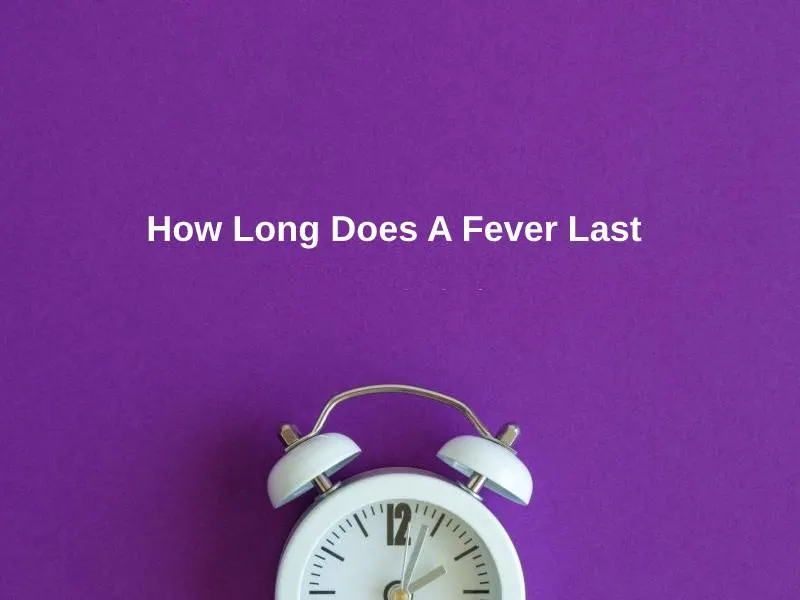Exact Answer: 1 to 3 days
Fever is also named Pyrexia. Fever is an increase in body temperature. Fever raised through exercise or menstrual cycle is not count as fever. It is recorded above 38°C in the thermometer. Oral and rectal readings give more accurate temperature than the axillary.
Fever is not a disease; it’s a symptom that indicates your body is trying to fight an illness or a disease. When there are several inflammations or infections in our body, the inflammatory cells such as White blood cells, Neutrophils produce chemicals known as Pyrogens. The chemical is carried by the blood to the brain. Hypothalamus regulates the body temperature, where Pyrogens set the thermal regulatory point of the hypothalamus to a higher temperature thus resulting in fever.
Fever normally lasts for about 1 to 3 days and it can be major or minor.

How Long Does Fever Last?
| Types | Time |
| Acute fever | Less than 7 days |
| Sub-acute fever | 2 weeks |
| Chronic fever | More than 2 weeks |
The fever causes mainly in the brain. The various causes of fever can be infections, tropical diseases, childhood diseases, and allergic reactions. Fever can affect infants, children, and adults. The condition can be acute fever or chronic fever and the time taken to recover is based on whether the person is affected by acute fever or chronic fever. Acute fever can last for a week and chronic fever certainly lasts longer than that.
Chronic fever can last for about more than 14 days. There are some differences in the symptoms between acute fever and chronic fever but they both have chills and shivering as the primary symptom. Acute fever normally occurs due to bacterial infection, while chronic fever occurs due to emotional stress.
Children are much more likely to get colds as compared to adults. As their immune system are not yet developed. In infants under 4 months old, you should see a pediatrician when the temperature rises to 38°C. An unexpected fever in infants can be a life-threatening problem. For adults, a fever is not a concern until the temperature reaches above 39.4°C. You should see a doctor if you have a fever higher than this.
Why Does Fever Last That Long?
Unlike acute fever, chronic fever lasts longer and this type of fever does not go away. Chronic fever is not a life-long condition. The severity of symptoms does not last forever. Chronic fever such as tuberculosis can be cured. A course of antibiotics needs to be taken for 6 months. Doctors classify fever as chronic when they find the person is coughing for at least 2 months.
If you have symptoms like headache, sweats, loss of appetite, rash, weakness, muscle aches, and dehydration. Visit the doctor as soon as possible. Make sure that you receive proper treatment. Acute fever symptoms appear all of a sudden, but the symptoms of chronic fever start developing gradually, and as time passes, the symptoms can get worse if left untreated.
The main cause of any type of fever is infections. There are other many possible causes of fever that are not easy for the doctor to diagnose. If the body temperature is above 38.3°C for more than 3 weeks without a cause being found, the doctor speaks of an unknown cause. The most common trigger in a fever of unknown causes is tuberculosis, autoimmune diseases, and tumors.
The most important thing is to find the cause of the fever and treat it immediately. Treatment depends upon the cause of the fever. If the fever is high, the doctor may recommend taking medicine such as acetaminophen. Adults may take aspirin, but children with fever should not take aspirin.
According to the World health organization, about 80 percent of infections are transmitted through the hands. Doctors recommend that to wash your hands regularly. A proper diet, regular exercise, staying hydrated, sleep enough to strengthen the immune system, and vaccination against influenza can help to prevent fever.
Conclusion
In the end, Health matters the most. A person must immediately visit the doctor if the temperature reaches 38°C or higher. It makes no sense to ignore the symptoms that can lead to danger ahead.
You can prevent a fever by washing your hands after visiting public places. However, there is no need to be nervous if you are suffering from chronic fever because there is almost zero percent chance that you will die.
References
- https://journals.asm.org/doi/abs/10.1128/CMR.12.4.518
- https://journals.physiology.org/doi/abs/10.1152/physrev.1991.71.1.93
,